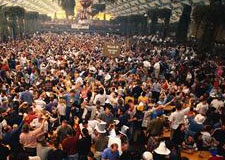The world’s population is expected to expand markedly by 2050 bringing with it plenty of challenges.
Questions over food provision, water and energy supplies are just some of the uncertainties that may lie ahead. Then again, it is possible that future research and development will offer solutions.
Issues like these will be discussed this Wednesday (January 19) at the first of this year’s series of Café Scientifique City – popular, stimulating and informal free events aimed at the public and organised by the University of Aberdeen’s Public Engagement with Science Team.
Professor Ian Diamond, Principal and Vice-Chancellor of the University, is leading the first session which takes place within the café at Waterstone’s Union Bridge book store in Aberdeen and starts at 7pm.
He said: “When world population is usually discussed many people take the view that it is growing too fast. However I will be addressing it from the angles of both high and low child bearing.”
Professor Diamond’s talk will be chaired by Professor Wendy Graham who heads up the University’s global research initiative - Immpact which is striving to improve the health of mothers and babies in developing countries.
Professor Graham said: “The rate of population growth in the future responds to actions we take today. But we don’t need to control people to slow population growth; we need to meet their needs for universal access to family planning and reproductive health services. This will improve the health of women and children, while also helping to increase people’s resilience to growing environmental challenges.”
The Café Scientifique series is supported by a Science Engagement grant from the Scottish Government.
Dr Ken Skeldon, Head of Public Engagement with Science at the University, added: “We are continuing to bring experts in their fields face to face with the public in an effort to create discussion in some fascinating areas. There will be events every month throughout the year and there is sure to be something to interest everyone.”
For more information about the Café series please see: http://www.abdn.ac.uk/science/cafescience/


